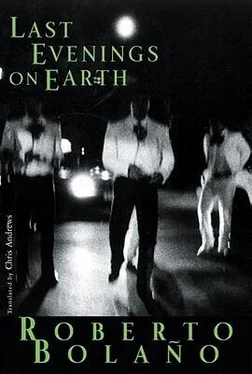He never talked to me again about Villaviciosa. For a month and a half, or maybe two months, we met each morning and at midday went our separate ways, when it was time for me to catch a bus back home to La Villa for lunch. Once I invited the Grub to see a movie, but he didn't want to. He liked to talk with me, either sitting on his bench in the Alameda or wandering around the neighboring streets, and every now and then he deigned to go into a bar, where he would always look for the turtle-egg vendor. I never saw him touch alcohol. A few days before he disappeared for good he got me to talk about Jacqueline Andere for some reason. I realized it was his way of remembering her. I talked about her ash-blonde hair and compared it favorably or unfavorably to the honey-blonde color it was in her films, and the Grub nodded almost imperceptibly, looking straight ahead as if the image of Jacqueline Andere were imprinted on his retinas or as if he were seeing her for the first time. Once I asked him what kind of women he liked. It was a stupid question, asked by an adolescent looking for something to say. But the Grub took it seriously and considered his reply for a long time. Finally he said, Calm women. And then he added, But only the dead are really calm. And after a while, Not even the dead, come to think of it.
One morning he gave me a knife. On the bone handle the word "Caborca" had been inscribed in fine letters of nickel silver. I remember thanking him effusively. That morning, as we talked in the Alameda or walked through the busy streets of the city center, I kept opening the blade and shutting it away again, admiring the handle, feeling its weight in the palm of my hand, marveling at its perfect proportions. Otherwise, that day was identical to all the others. The next morning the Grub was gone.
Two days later I went to his boarding house to look for him and they told me he had gone up north. I never saw him again.
Anne Moore's father served his country and the free world on a hospital ship in the Pacific from 1943 to 1945. His first daughter, Susan, was born while he was at sea off the Philippines, just before the end of World War II. Soon after, he returned to Chicago, where Anne was born in 1948. But Dr. Moore didn't like Chicago, so three years later, he and his family moved to Great Falls, Montana.
That is where Anne grew up. Her childhood was peaceful but it was also strange. In 1958, when she was ten years old, she glimpsed for the first time what she would later call the ashen (or the dirty) face of reality. Her sister had a boyfriend called Fred, who was fifteen. One Friday Fred came to the Moores' house and said that his parents had gone on a trip. Anne's mother said it wasn't right, he was just a boy, he shouldn't be left alone in the house like that. Anne's father reckoned that Fred was old enough to look after himself. That night Fred had dinner at the Moores' house, then sat on the porch chatting with Susan and Anne until ten. Before leaving he said good-bye to Mrs. Moore. Dr. Moore had already gone to bed.
The next day Fred took Susan and Anne for a drive around the park in his parents' car. According to what Anne told me, Fred's state of mind was noticeably different from the night before. He was preoccupied and hardly spoke, as if he and Susan had argued. For a while they just sat there in the car, in silence, Fred and Susan in the front and Anne in the back, then Fred proposed that they go to his house. Susan didn't answer. Fred started the car and drove to a poor neighborhood where Anne had never been; it was as if he was lost or, deep down, didn't really want to take them to his house, even though he was the one who had suggested it. Anne remembers that as they drove around Susan didn't look at Fred once; she spent the whole time looking out of the window, as if the houses and the streets slowly filing past were part of a never to be repeated show. And Fred, gazing fixedly straight ahead, didn't once look at Susan. Neither of them said a word or turned to look at the young girl in the backseat, although at one point, momentarily, she caught Fred's eye in the rearview mirror, staring at her, hard and bright.
When they finally arrived at Fred's house, neither Fred nor Susan made a move to get out. Even the way Fred parked the car on the street instead of in the garage was noncommittal, provisional, a deliberate pause. As if by parking like that, he was giving us and himself extra time to think, says Anne in hindsight.
After a while (Anne doesn't remember how long) Susan got out of the car, ordered her sister to do the same, took her by the hand, and they walked away without saying goodbye. When they were several yards away, Anne turned and saw the back of Fred's neck; he hadn't moved, he was still at the wheel, as if still driving, staring straight ahead, says Anne, although by then he may have closed or half-closed his eyes; he may have been looking down, or crying.
They walked back home and Susan refused to explain her behavior, in spite of Anne's questions. She wouldn't have been surprised to find Fred in their backyard that afternoon. It wasn't the first time he and her sister had fought, and they always made up soon afterward. But Fred didn't come around that Saturday, or on Sunday, and he wasn't in class on Monday, as Susan was later to confess. On Wednesday the police arrested Fred for drunken driving in a poor neighborhood of Great Falls. After questioning him, they went to his house and found the bodies of his parents: his mother's in the bathroom and his father's in the garage. His fathers body was partly wrapped in blankets and cardboard, as if Fred had been intending to dispose of it in the coming days.
As a result of this crime, Susan, who seemed at first to be coping remarkably well, had a nervous breakdown and was in therapy for several years with a series of psychologists. Anne, by contrast, was unaffected, although the incident, or the shadow it cast, would revisit her intermittently in later years. But at the time she didn't even dream about Fred, or if she did, she sensibly forgot the dreams as soon as she emerged from sleep.
At the age of seventeen, Anne went to college in San Francisco. Susan had gone there two years earlier, to study medicine at Berkeley, and was sharing an apartment with two other students in the southern part of Oakland, near San Leandro. Her letters home were rare. When Anne arrived she found her sister in a terrible state. Susan was not studying; she slept during the day, disappeared at night, and wouldn't come back until well into the next morning. Anne began a degree in English literature and took a course in Impressionist painting. She found an afternoon job at a Berkeley cafй. For a start she lived in the same room as her sister. In fact they could have gone on like that indefinitely. During the day, while Anne was at college, Susan was home sleeping, and at night she was hardly ever there, so they could make do with one bed. But after a month Anne moved to a place in Hackett Street, near the cafй where she was working, and stopped seeing her sister, although she would sometimes call her (it was always one of her housemates who answered the phone) to see how she was, pass on news about Great Falls, and find out if she needed anything. Susan was drunk the few times Anne got through to her. One morning they told her that Susan had moved out. For two weeks she searched all over Berkeley but couldn't find her. Finally one night she called her parents in Great Falls and it was her sister Susan who answered the phone. Anne couldn't believe it. She felt somehow cheated and betrayed. Susan had given up her studies for good and now she wanted to start over in a nice, quiet town, she said. If that's what you want to do, I'm sure that's best, said Anne, although in fact she felt her sister was a mess and throwing her life away.
Читать дальше












